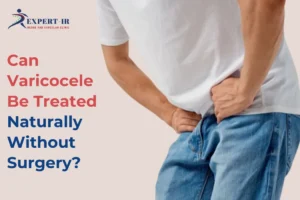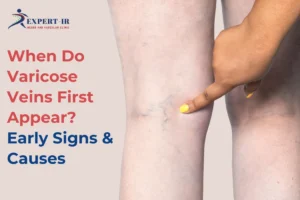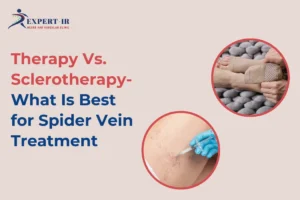
Can Varicocele Be Treated Naturally Without Surgery?
Can Varicocele Be Treated Naturally Without Surgery? A diagnosis of varicocele often raises anxiety, especially among young men concerned about fertility, pain, or the need

Varicose veins in women are not just a cosmetic concern—they are a vascular condition that can lead to discomfort, pain, and potential complications if left untreated. Often appearing as swollen, twisted, or bulging veins beneath the skin’s surface, varicose veins most commonly affect the legs and are more prevalent among women than men. This disparity is due to several contributing factors including hormonal fluctuations, pregnancy, genetics, and lifestyle choices. Understanding the underlying causes, associated risks, and available treatment options is crucial for early intervention and effective care.
Dr. Santosh Patil – Best Vascular Surgeon in Pune, is a leading expert in diagnosing and treating venous disorders in women. With years of experience and advanced clinical tools, he provides comprehensive care tailored to each woman’s individual needs.
Varicose veins are a result of venous insufficiency—a condition where the valves within the veins become weak or damaged, impairing proper blood flow. This leads to the pooling of blood, especially in the lower limbs, causing the veins to enlarge and twist.
In women, this condition is influenced significantly by hormonal factors. Estrogen and progesterone—two primary female hormones—can weaken vein walls and valves, making them more susceptible to damage. Pregnancy, use of oral contraceptives, and hormonal changes during menopause can all increase the risk of developing varicose veins.
Hormonal Fluctuations Hormones play a critical role in vein health. Estrogen and progesterone relax the vein walls, which can reduce venous tone and valve competence. Women using hormonal birth control or undergoing hormone replacement therapy may be at greater risk.
Pregnancy During pregnancy, blood volume increases significantly to support the growing fetus. This puts additional pressure on the veins, particularly in the legs. The enlarging uterus also compresses veins in the pelvic area, leading to venous backflow and the development of varicose veins.
Genetics If your mother or grandmother had varicose veins, there is a higher likelihood that you will too. A family history of venous disease increases the probability of developing the condition.
Prolonged Standing or Sitting Women who work in professions that require long hours of standing—like teachers, nurses, or retail staff—or sitting without movement are at increased risk. Inactivity slows blood flow, contributing to venous insufficiency.
Age and Menopause As women age, the risk of varicose veins increases due to natural wear and tear on the vein valves. Menopause brings hormonal changes that can further exacerbate venous insufficiency.
Obesity Excess weight increases the pressure on leg veins, which can damage valves and hinder blood flow.
Multiple Pregnancies Each pregnancy adds to the burden on your venous system. Women who have had multiple pregnancies are at a higher risk of developing varicose veins.
Dr. Santosh Patil emphasizes early diagnosis and intervention for varicose veins in women, as timely treatment can prevent complications like skin changes, ulcers, and deep vein thrombosis.
Estrogen and progesterone affect the structural integrity of veins. These hormones cause smooth muscle relaxation in the vein walls, leading to decreased vein tone.
This reduced tone increases vein diameter and causes blood to pool, triggering vein enlargement and valve dysfunction. Women may notice symptoms of varicose veins worsening during certain times of their menstrual cycle, pregnancy, or when taking hormonal medication.
Pregnancy is a unique physiological state that greatly impacts the venous system. As the uterus expands, it compresses the inferior vena cava and pelvic veins, impeding blood return from the legs. Hormonal changes further relax blood vessels. These changes can result in:
Most pregnancy-related varicose veins improve postpartum; however, some may persist and require medical attention.
Ignoring varicose veins can lead to serious health concerns such as:
Conservative Management
Minimally Invasive Procedures
a. Radiofrequency Ablation (RFA) Heat is used to seal the affected vein, leading to its gradual absorption by the body.
b. Endovenous Laser Treatment (EVLT) Similar to RFA but utilizes laser energy.
c. Sclerotherapy A chemical solution is injected to close small varicose and spider veins.
d. VenaSeal Closure System A medical adhesive is used to close the vein, eliminating the need for thermal energy.
Surgical Options
Dr. Santosh Patil is highly skilled in all modern vein treatment techniques and ensures personalized care for women suffering from varicose veins in Pune.
After treatment, women should:
With his deep understanding of female vascular anatomy and hormonal influence, Dr. Santosh Patil – Best Vascular Surgeon in Pune, offers expert care for women with varicose veins. He combines advanced diagnostic tools with minimally invasive treatments to ensure optimal results. His approach focuses on not just treating the veins but improving overall vascular health and preventing recurrence.
Reasons to Choose Dr. Santosh Patil:
Varicose veins in women are more than a cosmetic issue—they can signal underlying venous insufficiency and lead to severe complications if neglected. Hormonal changes, pregnancy, and genetic predisposition make women particularly vulnerable to this condition. Early intervention, accurate diagnosis, and expert care are essential to manage and treat varicose veins effectively.
If you or a loved one is suffering from varicose veins and looking for permanent relief, book a consultation with Dr. Santosh Patil today to explore advanced vein treatment options like RFA.

Can Varicocele Be Treated Naturally Without Surgery? A diagnosis of varicocele often raises anxiety, especially among young men concerned about fertility, pain, or the need

When Do Varicose Veins First Appear? Early Signs & Causes Varicose veins do not appear overnight. For most people, they develop gradually over months or

Therapy Vs. Sclerotherapy-What Is Best for Spider Vein Treatment Spider veins are small, visible red, blue, or purple veins that commonly appear on the legs

We offer a broad range of nonsurgical treatment options that solve various problems and instill a renewed zest in patient’s life.
Interventional Radiologist in Pune | Varicose Vein Treatment in Pune | Vascular Surgeon in Pune | Interventional Radiologist in Kharadi | Interventional Radiologist in Baner | Varicose vein treatment cost in Pune | Varicocele embolization cost in Pune | Varicocele surgery cost in Pune | Best doctor for varicose veins | Vascular Specialist in Pune | Varicose Vein Treatment in Kharadi | Varicose Vein Treatment in Baner | Interventional Radiologist in Wakad | Interventional Radiologist in Aundh | Interventional Radiologist in Pimple Saudagar | Varicose Vein Treatment in Aundh | Varicose Vein Treatment in Wakad | Varicose treatment near me | Varicose vein specialist in Pune | Veins doctor near me | Varicose treatment near me | Laser treatment for varicose veins | Varicose veins laser treatment cost | Varicose veins laser treatment cost in Pune | Thyroid Nodule ablation cost | Uterine Fibroid Embolization cost | Varicocele surgery cost in Mumbai | Varicose vein treatment cost in Pune | Varicocele embolization cost in Pune | Varicocele surgery cost in Pune | Venaseal treatment in Pune | Venaseal treatment for varicose vein
WhatsApp us